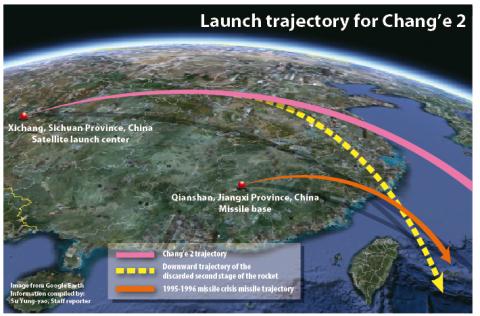Minister of National Defense Kao Hua-chu (高華柱) yesterday assured lawmakers across party lines that the military would be able to track Chinese missiles or satellite rockets in motion after the nation’s NT$30 billion (US$967.4 million) long-range early warning radar system is completed.
Kao made the remarks in response to questioning from Chinese Nationalist Party (KMT) Legislator Liao Wan-ju (廖婉汝) on whether the Ministry of National Defense (MND) has the capability to monitor the trajectory of China’s missiles or satellite rockets.
Liao, head of the legislature’s Foreign and National Defense Committee, raised her concerns after the Chinese-language Liberty Times (the Taipei Times’ sister paper) yesterday quoted National Space Organization Systems Engineering Director Chen Yen-sen (陳彥升) as saying that a fireball in the sky over eastern Taiwan about 7pm on Oct. 1 was the discarded second-stage rocket of China’s Chang’e 2 satellite.

Chen was quoted as saying that the trajectory of the rocket was similar to that of China’s missiles falling off the east coast during the Taiwan Strait Crisis between July 1995 and March 1996.
Kao said the rocket and the missiles had different heights and trajectories, adding that the National Science Council had dismissed Chen’s speculation as his personal opinion rather than an official statement by the council.
In another question-and-answer session, Democratic Progressive Party (DPP) Legislator Lee Chun-yee (李俊毅) also grilled defense officials over the matter.
Lee accused the ministry of refusing to make public that a Chinese rocket flew dangerously close to a location where China once lobbed rockets near Taiwan.
Lee pressed Kao by questioning whether the ministry had protested to Beijing for allowing the rocket to fly over Taiwanese airspace.
“If not, does this mean that Taiwan’s satellites or missile tests can fly over China’s airspace?” Lee asked.
Kao did not answer, but told Lee that he would tell him in private after the open session.
Kao’s response, however, prompted further criticism from Lee, who called the defense minister “irresponsible.”
At a separate setting, ministry officials said that given that the trajectory of China’s satellite Chang’e 2 was hundreds of kilometers above the earth, it generally does not consider it an intrusion of airspace.
The ministry said it therefore dismissed the launch of Chang’e 2 as a concern for Taiwan’s national security or as an intrusion of the nation’s airspace.
ADDITIONAL REPORTING BY HSU SHAO-HSUAN AND VINCENT Y. CHAO

AIR SUPPORT: The Ministry of National Defense thanked the US for the delivery, adding that it was an indicator of the White House’s commitment to the Taiwan Relations Act Deputy Minister of National Defense Po Horng-huei (柏鴻輝) and Representative to the US Alexander Yui on Friday attended a delivery ceremony for the first of Taiwan’s long-awaited 66 F-16C/D Block 70 jets at a Lockheed Martin Corp factory in Greenville, South Carolina. “We are so proud to be the global home of the F-16 and to support Taiwan’s air defense capabilities,” US Representative William Timmons wrote on X, alongside a photograph of Taiwanese and US officials at the event. The F-16C/D Block 70 jets Taiwan ordered have the same capabilities as aircraft that had been upgraded to F-16Vs. The batch of Lockheed Martin

US President Donald Trump yesterday announced sweeping "reciprocal tariffs" on US trading partners, including a 32 percent tax on goods from Taiwan that is set to take effect on Wednesday. At a Rose Garden event, Trump declared a 10 percent baseline tax on imports from all countries, with the White House saying it would take effect on Saturday. Countries with larger trade surpluses with the US would face higher duties beginning on Wednesday, including Taiwan (32 percent), China (34 percent), Japan (24 percent), South Korea (25 percent), Vietnam (46 percent) and Thailand (36 percent). Canada and Mexico, the two largest US trading

GRIDLOCK: The National Fire Agency’s Special Search and Rescue team is on standby to travel to the countries to help out with the rescue effort A powerful earthquake rocked Myanmar and neighboring Thailand yesterday, killing at least three people in Bangkok and burying dozens when a high-rise building under construction collapsed. Footage shared on social media from Myanmar’s second-largest city showed widespread destruction, raising fears that many were trapped under the rubble or killed. The magnitude 7.7 earthquake, with an epicenter near Mandalay in Myanmar, struck at midday and was followed by a strong magnitude 6.4 aftershock. The extent of death, injury and destruction — especially in Myanmar, which is embroiled in a civil war and where information is tightly controlled at the best of times —

China's military today said it began joint army, navy and rocket force exercises around Taiwan to "serve as a stern warning and powerful deterrent against Taiwanese independence," calling President William Lai (賴清德) a "parasite." The exercises come after Lai called Beijing a "foreign hostile force" last month. More than 10 Chinese military ships approached close to Taiwan's 24 nautical mile (44.4km) contiguous zone this morning and Taiwan sent its own warships to respond, two senior Taiwanese officials said. Taiwan has not yet detected any live fire by the Chinese military so far, one of the officials said. The drills took place after US Secretary